| Pubblicato su: | The Monist, anno XIV, Vol. XIII, fasc. 4, pp. 553-585 | ||
| 51-552-(553-554-555-556-557-558-559-560 561-562-563-564-565-566-567-568-569-570 571-572-573-574-575-576-577-578-579-580 581-582-583-584-585)-586-587-588-589590 |
|||
| Data: | July 1st 1903 |
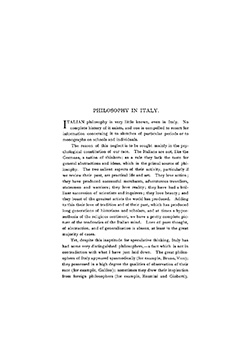
pag.553
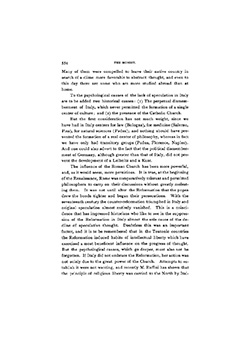
pag.554
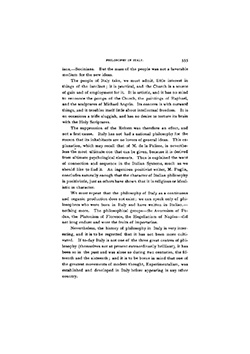
pag.555
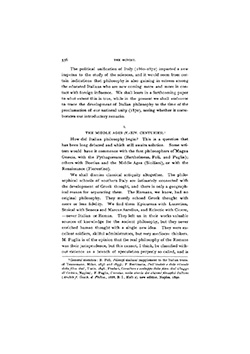
pag.556
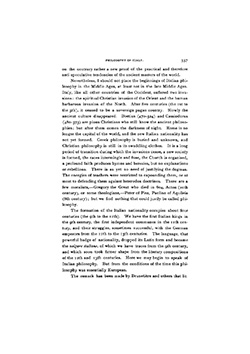
pag.557
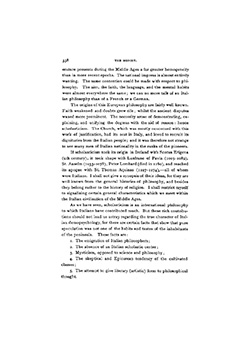
pag.558
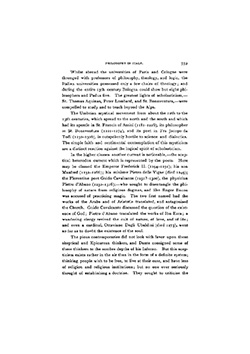
pag.559
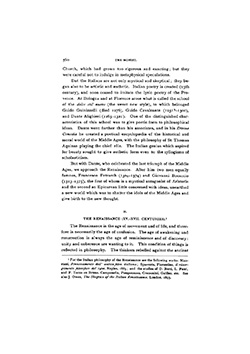
pag.560
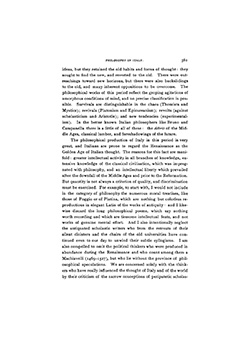
pag.561
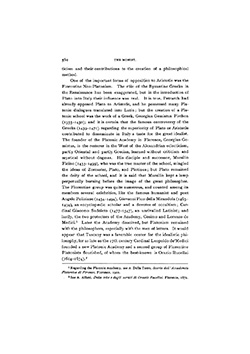
pag.562
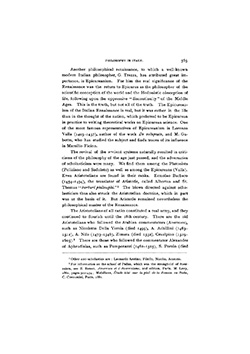
pag.563
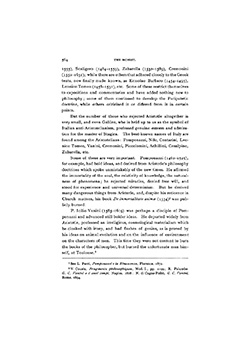
pag.564
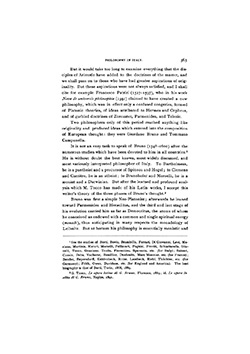
pag.565
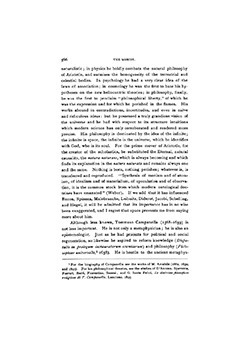
pag.566
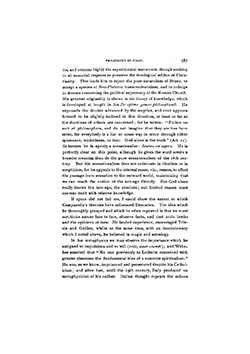
pag.567
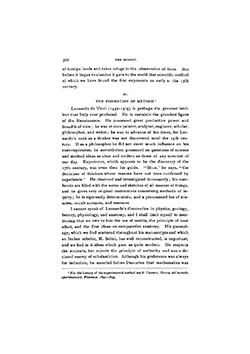
pag.568
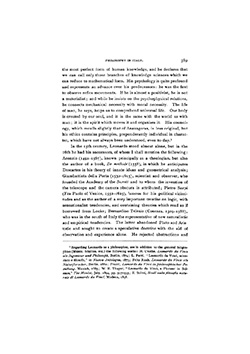
pag.569
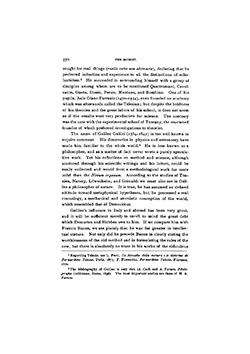
pag.570
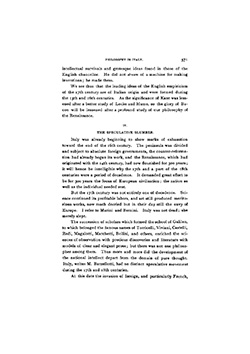
pag.571
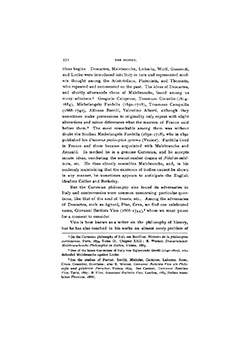
pag.572
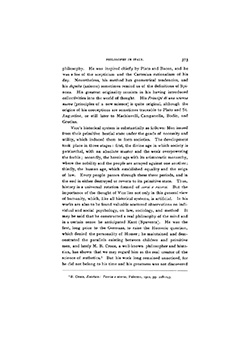
pag.573
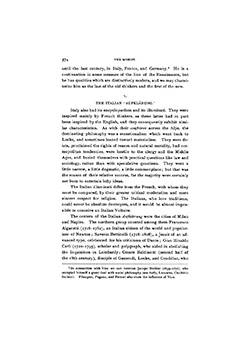
pag.574
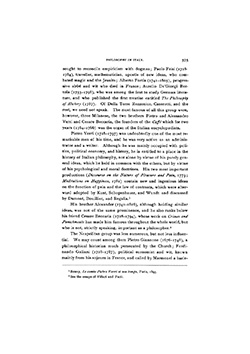
pag.575
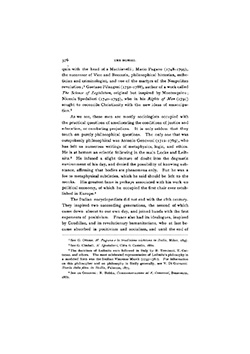
pag.576
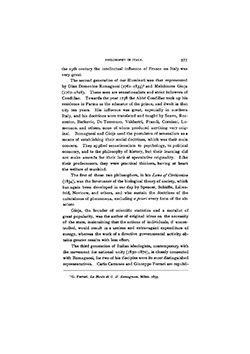
pag.577
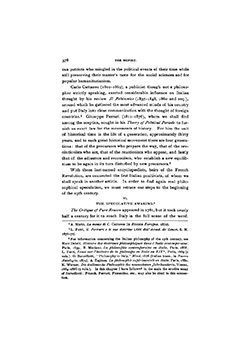
pag.578
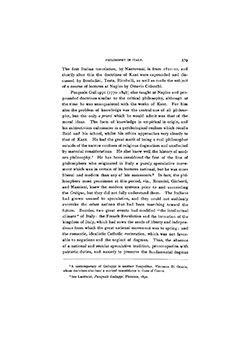
pag.579
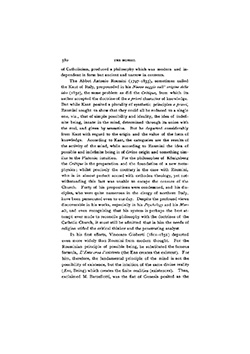
pag.580
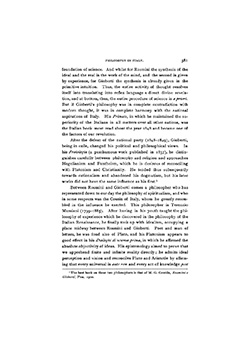
pag.581
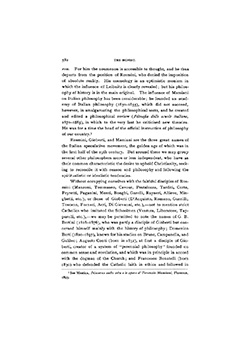
pag.582
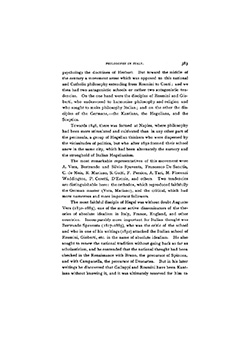
pag.583
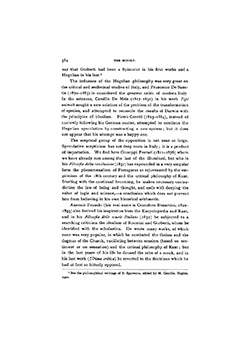
pag.584
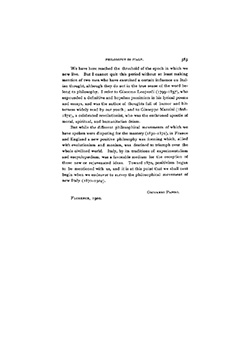
pag.585
553
ITALIAN philosophy is very little known, even in Italy. No complete history of it exists, and one is compelled to resort for information concerning it to sketches of particular periods or to monographs on schools and individuals.
The reason of this neglect is to be sought mainly in the psychological constitution of our race. The Italians are not, like the Germans, a nation of thinkers; as a rule they lack the taste for general abstractions and ideas, which is the primal source of philosophy. The two salient aspects of their activity, particularly if we review their past, are practical life and art. They love action; they have produced successful merchants, adventurous travellers, statesmen and warriors; they love reality; they have had a brilliant succession of scientists and inquirers; they love beauty; and they boast of the greatest artists the world has produced. Adding to this their love of tradition and of their past, which has produced long generations of historians and scholars, and at times a hyperaesthesia of the religious sentiment, we have a pretty complete picture of the tendencies of the Italian mind. Love of pure thought, of abstraction, and of generalisation is absent, at least in the great majority of cases.
Yet, despite this inaptitude for speculative thinking, Italy has had some very distinguished philosophers,—a fact which is not in contradiction with what I have just laid down. The great philosophers of Italy appeared spasmodically (for example, Bruno, Vico); they possessed in a high degree the qualities of observation of their race (for example, Galileo); sometimes they drew their inspiration from foreign philosophers (for example, Rosmini and Gioberti).
554
Many of them were compelled to leave their native country in search of a clime more favorable to abstract thought, and even to this day there are some who are more studied abroad than at home.
To the psychological causes of the lack of speculation in Italy are to be added two historical causes: (1) The perpetual dismemberment of Italy, which never permitted the formation of a single center of culture; and (2) the presence of the Catholic Church.
But the first consideration has not much weight, since we have had in Italy centers for law (Bologna), for medicine (Salerno, Pisa), for natural sciences (Padua); and nothing should have prevented the formation of a real center of philosophy, whereas in fact we have only had transitory groups (Padua, Florence, Naples). And one could also advert to the fact that the political dismemberment of Germany, although greater than that of Italy, did not prevent the development of a Leibnitz and a Kant.
The influence of the Roman Church has been more powerful, and, as it would seem, more pernicious. It is true, at the beginning of the Renaissance, Rome was comparatively tolerant and permitted philosophers to carry on their discussions without greatly molesting them. It was not until after the Reformation that the popes drew the bonds tighter and began their persecutions. With the seventeenth century the counter-reformation triumphed in Italy and original speculation almost entirely vanished. This is a coincidence that has impressed historians who like to see in the suppression of the Reformation in Italy almost the sole cause of the decline of speculative thought. Doubtless this was an important factor, and it is to be remembered that in the Teutonic countries the Reformation induced habits of intellectual liberty which have exercised a most beneficent influence on the progress of thought. But the psychological causes, which go deeper, must also not be forgotten. If Italy did not embrace the Reformation, her action was not solely due to the great power of the Church. Attempts to establish it were not wanting, and recently M. Ruffini has shown that the principle of religious liberty was carried to the North by Italians,—Socinians.
555
But the mass of the people was not a favorable medium for the new ideas.
The people of Italy take, we must admit, little interest in things of the intellect; it is practical, and the Church is a source of gain and of employment for it. It is artistic, and it has no mind to renounce the pomps of the Church, the paintings of Raphael, and the sculptures of Michael Angelo. Its concern is with outward things, and it troubles itself little about intellectual freedom. It is on occasions a trifle sluggish, and has no desire to torture its brain with the Holy Scriptures.
The suppression of the Reform was therefore an effect, and not a first cause. Italy has not had a national philosophy for the reason that its inhabitants are no lovers of general ideas. This explanation, which may recall that of M. de la Palisse, is nevertheless the most ultimate one that can be given, because it is derived from ultimate psychological elements. Thus is explained the want of connection and sequence in the Italian Systems, much as we should like to find it. An ingenious positivist writer, M. Puglia, concludes naturally enough that the character of Italian philosophy is positivistic, just as others have shown that it is religious or idealistic in character.
We must repeat that the philosophy of Italy as a continuous and organic production does not exist; we can speak only of philosophers who were born in Italy and have written in Italian,—nothing more. The philosophical groups—the Averroism of Padua, the Platonism of Florence, the Hegelianism of Naples—did not long endure and were the fruits of importation.
Nevertheless, the history of philosophy in Italy is very interesting, and it is to be regretted that it has not been more cultivated. If today Italy is not one of the three great centres of philosophy (themselves not at present extraordinarily brilliant), it has been so in the past and was alone so during two centuries, the fifteenth and the sixteenth; and it is to be borne in mind that one of the greatest movements of modern thought, Experimentalism, was established and developed in Italy before appearing in any other country.
556
The political unification of Italy (1860-1870) imparted a new impetus to the study of the sciences, and it would seem from certain indications that philosophy is also gaining in esteem among the educated Italians who are now coming more and more in contact with foreign influence. We shall learn in a forthcoming paper to what extent this is true, while in the present we shall endeavor to trace the development of Italian philosophy to the time of the proclamation of our national unity (1870), seeing whether it corroborates our introductory remarks.
1 General sketches: B. Poli, Filosofi italiani (supplement to the Italian trans. of Tennemann, Milan, 1836 and 1855); F. Bertinaria, Dell'indole e delle vicende della filos. ital., Turin, 1846; Predari, Carattere e sviluppo della filos. ital. (Saggi di Critica, Naples); F. Puglia, L'evoluz. nella storia dei sistemi filosofici italiani (Archiv f. Gesch. d. Philos., 1888, B. I., Heft 2), new edition, Naples, 1890.
How did Italian philosophy begin? This is a question that has been long debated and which still awaits solution. Some writers would have it commence with the fist philosophers of'Magna Graecia, with the Pythagoreans (Bartholmess, Poli, and Puglia); others with Boetius and the Middle Ages (Siciliani), or with the Renaissance (Fiorentino).
We shall dismiss classical antiquity altogether. The philosophical schools of southern Italy are intimately connected with the development of Greek thought, and there is only a geographical reason for separating them. The Romans, we know, had no original philosophy. They merely echoed Greek thought with more or less fidelity. We find them Epicurean with Lucretius, Stoical with Seneca and Marcus Aurelius, and Eclectic with Cicero, —never Italian or Roman. They left us in their works valuable sources of knowledge for the ancient philosophy, but they never enriched human thought with a single new idea. They were excellent soldiers, skilful administrators, but very mediocre thinkers. M. Puglia is of the opinion that the real philosophy of the Romans was their jurisprudence, but this cannot, I think, be classified without violence as a branch of speculation properly so called, and is
557
on the contrary rather a new proof of the practical and therefore anti speculative tendencies of the ancient masters of the world.
Nevertheless, I should not place the beginnings of Italian philosophy in the Middle Ages, at least not in the late Middle Ages. Italy, like all other countries of the Occident, suffered two invasions: the spiritual Christian invasion of the Orient and the human barbarous invasion of the North. After five centuries (the 1st to the 5th), it ceased to be a sovereign pagan country. Slowly the ancient culture disappeared. Boetius (470-524) and Cassiodorus (480-575) are pious Christians who still know the ancient philosophies; but after them comes the darkness of night. Rome is no longer the capital of the world, and the new Italian nationality has not yet formed. Greek philosophy is buried and unknown, and Christian philosophy is still in its swaddling clothes. It is a long period of transition during which the invasions cease, a new society is formed, the races intermingle and fuse, the Church is organised, a profound faith produces hymns and heresies, but no explanations or rebellions. There is as yet no need of justifying the dogmas. The energies of teachers were restricted to expounding them, or at most to defending them against heterodox doctrines. There are a few moralists, —Gregory the Great who died in 604, Acton (10th century), or some theologians, —Peter of Pisa, Paolino of Aquileia (8th century); but we find nothing that could justly be called philosophy.
The formation of the Italian nationality occupies about four centuries (the 9th to the 11th). We have the first Italian kings in the 9th century, the first independent communes in the 11th century, and their struggles, sometimes successful, with the German emperors from the 11th to the 13th centuries. The language, that powerful badge of nationality, dropped its Latin form and became the volgare italiano, of which we have traces from the 9th century, and which soon took firmer shape from the literary compositions of the 12th and 13th centuries. Here we may begin to speak of Italian philosophy. But from the conditions of the time this philosophy was essentially European.
The remark has been made by Brunetière and others that literature
558
presents during the Middle Ages a far greater homogeneity than in more recent epochs. The national impress is almost entirely wanting. The same contention could be made with respect to philosophy. The aim, the faith, the language, and the mental habits were almost everywhere the same; we can no more talk of an Italian philosophy than of a French or a German.
The origins of this European philosophy are fairly well known. Faith weakened and doubts grew rife; whilst the ancient disputes waxed more prominent. The necessity arose of demonstrating, explaining, and unifying the dogmas with the aid of reason: hence scholasticism. The Church, which was mostly concerned with this work of justification, had its seat in Italy, and loved to recruit its dignitaries from the Italian people; and it was therefore not strange to see many men of Italian nationality in the ranks of the pioneers.
If scholasticism took its origin in Ireland with Scotus Erigena (9th century), it took shape with Lanfranc of Pavia (1005-1089). St. Anselm (1033-1078), Peter Lombard (died in i16o), and reached its apogee with St. Thomas Aquinas (1227-1274), -all of whom were Italians. I shall not give a synopsis of their ideas, for they are well known from the general histories of philosophy, and besides they belong rather to the history of religion. I shall restrict myself to signalising certain general characteristics which we meet within the Italian civilisation of the Middle Ages.
As we have seen, scholasticism is an international philosophy to which Italians have contributed much. But these rich contributions should not lead us astray regarding the true character of Italian demopsychology, for there are certain facts that show that pure speculation was not one of the habits and tastes of the inhabitants of the peninsula. These facts are :
1. The emigration of Italian philosophers;
2. The absence of an Italian scholastic center;
3. Mysticism, opposed to science and philosophy;
4. The skeptical and Epicurean tendency of the cultivated classes;
5. The attempt to give literary (artistic) form to philosophical thought.
559
Whilst abroad the universities of Paris and Cologne were thronged with professors of philosophy, theology, and logic, the Italian universities possessed only a few chairs of theology; and during the entire 13th century Bologna could show but eight philosophers and Padua five. The greatest lights of scholasticism, —St. Thomas Aquinas, Peter Lombard, and St. Bonaventura, —were compelled to study and to teach beyond the Alps.
The Umbrian mystical movement from about the 12th to the 13th centuries, which spread to the north and the south and which had its apostle in St. Francis of Assisi (1181-1226), its philosopher in St. Bonaventura (1221-1274), and its poet in Fra Jacopo da Todi (1230-1306), is outspokenly hostile to science and dialectics. The simple faith and sentimental contemplation of this mysticism are a distinct reaction against the logical spirit of scholasticism.
In the higher classes another current is noticeable, —the sceptical heterodox current which is represented by the poets. Here may be classed the Emperor Frederick II. (1194-1250); his son Manfred (1232-1266); his minister Pietro delle Vigne (died 1249); the Florentine poet Guido Cavalcante (1251?-1300), the physician Pietro d'Abano (1250-1316); —who sought to disentangle the philosophy of nature from religious dogmas, and like Roger Bacon was accused of practicing magic. The two first named had the works of the Arabs and of Aristotle translated, and antagonised the Church. Guido Cavalcante discussed the question of the existence of God; Pietro d'Abano translated the works of Ibn Ezra; a wandering clergy revived the cult of nature, of love, and of life; and even a cardinal, Ottaviano Degli Ubaldini (died 1273), went so far as to doubt the existence of the soul.
The pious contemporaries did not look with favor upon these skeptical and Epicurean thinkers, and Dante consigned some of these thinkers to the sombre depths of his Inferno. But this scepticism exists rather in the air than in the form of a definite system; thinking people wish to be free, to live at their ease, and have less of religion and religious institutions; but no one ever seriously thought of establishing a doctrine. They sought to criticise the
560
Church, which had grown too rigorous and exacting; but they were careful not to indulge in metaphysical speculations.
But the Italians are not only mystical and skeptical; they began also to be artistic and aesthetic. Italian poetry is created (13th century), and soon ceased to imitate the lyric poetry of the Provence. At Bologna and at Florence arose what is called the school of the dolce stil nuovo (the sweet new style), to which belonged Guido Guinizzelli (died 1276), Guido Cavalcante (1251?-1300), and Dante Alighieri (1265-1321). One of the distinguished characteristics of this school was to give poetic form to philosophical ideas. Dante went farther than his associates, and in his Divina Comedia he created a poetical encyclopaedia of the historical and moral world of the Middle Ages, with the philosophy of St. Thomas Aquinas playing the chief role. The Italian genius which aspired for beauty sought to give aesthetic form even to the syllogisms of scholasticism.
But with Dante, who celebrated the last triumph of the Middle Ages, we approach the Renaissance. After him two men equally famous, Francesco Petrarch (1304-1374) and Giovanni Bocaccio (1313-1375), the first of whom is a mystical antagonist of Aristotle and the second an Epicurean little concerned with ideas, unearthed a new world which was to shatter the idols of the Middle Ages and give birth to the new thought.
2 For the Italian philosophy of the Renaissance see the following works: Manriani, Rinnovamento dell'antica filos. italiana; Spaventa, Fiorentino, Il risorgimento filosofico del 1400, Naples, 1883; and the studies of D. Berti, L. Ferri, and F. Tocco on Bruno, Campanella, Pomponazzo, Cremonini, Galileo, etc. See also J. Owen, The Skeptics of the Italian Renaissance, London, 1893.
The Renaissance is the age of movement and of life, and therefore is necessarily the age of confusion. The age of awakening and resurrection is always the age of reminiscence and of discovery: unity and coherence are wanting to it. This condition of things is reflected in philosophy. The thinkers rebelled against the ancient
561
ideas, but they retained the old habits and forms of thought: they sought to find the new, and reverted to the old. There were outreachings toward new horizons, but there were also backslidings to the old, and many inherent oppositions to be overcome. The philosophical works of this period reflect the groping agitations of amorphous conditions of mind, and no precise classification is possible. Survivals are distinguishable in the chaos (Thomists and Mystics); revivals (Platonism and Epicureanism); revolts (against scholasticism and Aristotle); and new tendencies (experimentalism). In the better known Italian philosophers like Bruno and Campanella there is a little of all of these: the débris of the Middle Ages, classical lumber, and foreshadowings of the future.
The philosophical production of Italy in this period is very great, and Italians are prone to regard the Renaissance as the Golden Age of Italian thought. The reasons for this fact are manifold: greater intellectual activity in all branches of knowledge, extensive knowledge of the classical civilisation, which was impregnated with philosophy, and an intellectual liberty which prevailed after the downfall of the Middle Ages and prior to the Reformation. But quantity is not always a criterion of quality, and discrimination must be exercised. For example, to start with, I would not include in the category of philosophy the numerous moral treatises, like those of Poggio or of Platina, which are nothing but colorless reproductions in elegant Latin of the works of antiquity and I likewise discard the long philosophical poems, which say nothing worth recording and which are tiresome intellectual feats, and not works of genuine mental effort. And I also intentionally neglect the antiquated scholastic writers who from the retreats of their silent cloisters and the chairs of the old universities have continued even to our day to unwind their subtle syllogisms. I am also compelled to omit the political thinkers who were produced in abundance during the Renaissance and who count among them a Machiavelli (1469-1527), but who lie without the province of philosophical speculations. We are concerned solely with the thinkers who have really influenced the thought of Italy and of the world by their criticism of the narrow conceptions of peripatetic scholasticism
562
and their contributions to the creation of a philosophical method.
One of the important forms of opposition to Aristotle was the Florentine Neo-Platonism. The role of the Byzantine Greeks in the Renaissance has been exaggerated, but in the introduction of Plato into Italy their influence was real. It is true, Petrarch had already opposed Plato to Aristotle, and he possessed many Platonic dialogues translated into Latin; but the creation of a Platonic school was the work of a Greek, Georgius Gemistus Plethon (I355-1450); and it is certain that the famous controversy of the Greeks (1439-1471) regarding the superiority of Plato or Aristotle contributed to disseminate in Italy a taste for the great idealist. The founder of the Platonic Academy in Florence, Georgius Gemistus, is the restorer in the West of the Alexandrian eclecticism, partly Oriental and partly Grecian, learned without criticism and mystical without dogmas. His disciple and successor, Marsilio Ficino (1433-1499), who was the true master of the school, mingled the ideas of Zoroaster, Plato, and Plotinus; but Plato remained the deity of the school, and it is said that Marsilio kept a lamp perpetually burning before the image of the great philosopher. The Florentine group was quite numerous, and counted among its members several celebrities, like the famous humanist and poet Angelo Poliziano (1454-1494), Giovanni Pico della Mirandola (1463¬1494), an encyclopaedic scholar and a devotee of occultism; Cardinal Giacomo Sadoleto (1477-1547), an unrivalled Latinist; and lastly, the two protectors of the Academy, Cosimo and Lorenzo de Medici. 3
3 Regarding the Platonic Academy, see A. Della Torre; Storia dell' Accademia Platonica di Firenze, Florence, 1902.
Later the Academy dissolved, but Platonism remained with the philosophers, especially with the men of letters. It would appear that Tuscany was a favorable center for the idealistic philosophy, for as late as the 17th century Cardinal Leopoldo de'Medici founded a new Platonic Academy and a second group of Florentine Platonists flourished, of whom the best-known is Orazio Rucellai (1604-1674).
4
563
Another philosophical renaissance, to which a well-known modern Italian philosopher, G. Trezza, has attributed great importance, is Epicureanism. For him the real significance of the Renaissance was the return to Epicurus as the philosopher of the scientific conception of the world and the Hedonistic conception of life, following upon the oppressive "discontinuity" of the Middle Ages. This is the truth, but not all of the truth. The Epicureanism of the Italian Renaissance is real, but it was rather in the life than in the thought of the nation, which preferred to be Epicurean in practice to writing theoretical works on Epicurean science. One of the most famous representatives of Epicureanism is Lorenzo Valla (1405-1457), author of the work De voluptate, and M. Gabotto, who has studied the subject and finds traces of its influence in Marsilio Ficino.
The revival of the ancient systems naturally resulted in criticisms of the philosophy of the age just passed, and the adversaries of scholasticism were many. We find them among the Platonists (Poliziano and Sadoleto) as well as among the Epicureans (Valla). Even Aristotelians are found in their ranks. Ermolao Barbaro (1454-1494), the translator of Aristotle, called Albertus and St. Thomas "barbari philosophi." 5 The blows directed against scholasticism thus also struck the Aristotelian doctrine, which in part was at the basis of it. But Aristotle remained nevertheless the philosophical master of the Renaissance.
The Aristotelians of all ranks constituted a real army, and they continued to flourish until the 18th century. There are the old Aristotelians who followed the Arabian commentators (Averroes), such as Nicoletto Della Vernia (died 1499), A. Achillini (1463¬1512), A. Nifo (1473-1546), Zimara (died 1532), Cesalpino (1519¬1603). 6
6 For information on the school of Padua, which was the stronghold of Averroism, see E. Renan, Averroes et l'Averroisme, 2nd edition, Paris, M. Levy, 1861, pages 322-434; Mabilleau, Étude hist. sur la Phil. de la Renais. en Italie, C. Cremonini, Paris, 1881.
There are those who followed the commentator Alexander of Aphrodisias, such as Pomponazzi (1462-1525), S. Porzio (died564
1555), Scaligero (1484-1559), Zabarella (1532-1589), Cremonini (1552-1631); while there are others that adhered closely to the Greek texts, now finally made known, as Ermolao Barbaro (1454-1493), Leonico Tomeo (1456-1531), etc. Some of these restrict themselves to expositions and commentaries and have added nothing new to philosophy; some of them continued to develop the Peripatetic doctrine, while others criticised it or differed from it in certain points.
But the number of those who rejected Aristotle altogether is very small, and even Galileo, who is held up to us as the symbol of Italian anti-Aristotelianism, professed genuine esteem and admiration for the master of Stagira. The best-known names of Italy are found among the Aristotelians: Pomponazzi, Nifo, Contarini, Leonico Tomeo, Vanini, Cremonini, Piccolomini, Achillini, Cesalpino, Zabarella, etc.
Some of these are very important. Pomponazzi (1462-1525), for example, had bold ideas, and derived from Aristotle's philosophy doctrines which spoke unmistakably of the new times. He affirmed the immortality of the soul, the relativity of knowledge, the naturalness of phenomena; he rejected miracles, denied free will, and stood for experience and universal determinism. But he derived many dangerous things from Aristotle, and, despite his reticence in Church matters, his book De immortalitate animae (1534) 7 was publicly burned.
P. Icilio Vanini (1585-1619) was perhaps a disciple of Pomponazzi and advanced still bolder ideas. He departed widely from Aristotle, professed an irreligious, cosmological materialism which he cloaked with irony, and had flashes of genius, as is proved by his ideas on animal evolution and on the influence of environment on the characters of men. This time they were not content to burn the books of the philosopher, but burned the unfortunate man himself, at Toulouse. 8
8 V. Cousin, Fragments philosophiques, Mod. I., pp. 1-99; R. Palumbo G. C. Vanini e i suoi tempi, Naples, 1878; N. di Cagno-Politi, G. C. Vanini, Rome, 1894.
565
But it would take too long to examine everything that the disciples of Aristotle have added to the doctrines of the master, and we shall pass on to those who have had greater aspirations of originality. But these aspirations were not always satisfied, and I shall cite for example Francesco Patrizi (1527-1597), who in his work Nova de universis philosophia (1591) claimed to have created a new philosophy, which was in effect only a confused congeries, formed of Platonic theories, of ideas attributed to Hermes and Orpheus, and of garbled doctrines of Zoroaster, Parmenides, and Telesio.
Two philosophers only of this period reached anything like originality and produced ideas which entered into the composition of European thought: they were Giordano Bruno and Tommaso Campanella.
It is not an easy task to speak of Bruno (1548-1600) after the numerous studies which have been devoted to him in all countries. 9
9 See the studies of Berti, Bovio, Brambilla, Ferrari, Di Giovanni, Levi, Mariano, Martinis, Maturi, Morselli, Pellizzari, Pognisi, Previti, Schiattarella, Stiavelli, Tocco, Graziano, Troilo, Fiorentino, Spaventa, etc. (for Italy); Saisset, Cousin, Debs, Vacherot, Bouillier, Desdouits, Marc Monnier, etc. (for France); Bender, Beyersdorff, Kuhlenbeck, Ritter, Landseck, Riehl, Thikotter, etc. (for Germany); Frith, Owen, Davidson, etc. (for England and America). The best biography is that of Berti, Turin, 1868, 1889.
He is without doubt the best known, most widely discussed, and most variously interpreted philosopher of Italy. To Bartholmess, he is a pantheist and a precursor of Spinoza and Hegel; to Clemens and Carriere, he is an atheist; to Brunnhofer and Morselli, he is a monist and a Darwinian. But after the learned and profound analysis which M. Tocco has made of his Latin works, I accept this writer's theory of the three phases of Bruno's thought.
10
10 G. Tocco, Le opere latine di G. Bruno, Florence, 1889 ; id. Le opere inedite di G. Bruno, Naples, 1891.
Bruno was first a simple Neo-Platonist; afterwards he leaned toward Parmenides and Heraclitus, and the third and last stage of his evolution carried him as far as Democritus, the atoms of whom he conceived as endowed with a common and single spiritual energy (monadi), thus anticipating in many respects the monadology of Leibnitz. But at bottom his philosophy is essentially monistic and
566
naturalistic; in physics he boldly combats the natural philosophy of Aristotle, and surmises the homogeneity of the terrestrial and celestial bodies. In psychology he had a very clear idea of the laws of association; in cosmology he was the first to base his hypotheses on the new heliocentric theories; in philosophy, finally, he was the first to proclaim "philosophical liberty," of which he was the expression and for which he perished in the flames. His works abound in contradictions, incertitudes, and even in naïve and ridiculous ideas but he possessed a truly grandiose vision of the universe and he had with respect to its structure intuitions which modern science has only corroborated and rendered more precise. His philosophy is dominated by the idea of the infinite; the infinite is space, the infinite is the universe, which he identifies with God, who is its soul. For the prime mover of Aristotle, for the creator of the scholastics, he substituted the Eternal, natural causality, the natura naturans, which is always becoming and which finds its explanation in the natura naturata and remains always one and the same. Nothing is born, nothing perishes; whatever is, is transferred and reproduced. "Synthesis of monism and of atomism, of idealism and of materialism, of speculation and of observation, it is the common stock from which modern ontological doctrines have emanated" (Weber). If we add that it has influenced Bacon, Spinoza, Malebranche, Leibnitz, Diderot, Jacobi, Schelling, and Hegel, it will be admitted that its importance has in no wise been exaggerated, and I regret that space prevents me from saying more about him.
Although less known, Tommaso Campanella (1568-1639) is not less important. He is not only a metaphysician; he is also an epistemologist. Just as he had protects for political and social regeneration, so likewise he aspired to reform knowledge (Disputatio in prologum instauratarum scientiarum) and philosophy (Philosophiae universalis, 11
11 For the biography of Campanella see the works of M. Amabile (1882, 1890, and 1895). For his philosophical theories, see the studies of D'Ancona, Spaventa, Ferrari, Berti, Fiorentino, Sanesi; and G. Sante Felici, Le dottrine filosofico-religiose di T. Campanella, Lanciano, 1895.
1638). He is hostile to the ancient metaphysics,567
and esteems highly the experimental movement, though seeking in all essential respects to preserve the theological edifice of Christianity. This leads him to reject the pure naturalism of Bruno, to accept a species of Neo-Platonic transcendentalism, and to indulge in dreams concerning the political supremacy of the Roman Church. His greatest originality is shown in his theory of knowledge, which is developed at length in his De optimo genere philosophandi. He expounds the doubts advanced by the sceptics, and even appears himself to be slightly inclined in this direction, at least so far as the doctrines of others are concerned; for he writes: "Follow no sect of philosophers, and do not imagine that they are free from error, for everybody is a liar or some way in error through either ignorance, wickedness, or fear. God alone is the truth" (Art. II). At bottom he is openly a sensationalist: Sentire est sapere. He is perfectly clear on this point, although he gives the word sentire broader meaning than do the pure sensationalists of the 18th century. But his sensationalism does not culminate in idealism or in scepticism, for he appeals to the internal sense, viz., reason, to effect the passage from sensation to the outward world, maintaining that we can reach the notion of the non-ego directly. But God alone really knows the non-ego, the absolute; our limited reason must content itself with relative knowledge.
If space did not fail me, I could show the extent to which Campanella's theories have influenced Descartes. The idea which he thoroughly grasped and which he often repeated is that we must scrutinise nature face to face, observe facts, and cast aside books and the opinions of men. He lauded experience, encouraged Telesio and Galileo, whilst at the same time, with an inconsistency which I noted above, he believed in magic and astrology.
In his metaphysics we may observe the importance which he assigned to impulsions and to will (velle, amor essendi); and Weber has asserted that "No one previously to Leibnitz conceived with greater clearness the fundamental idea of a concrete spiritualism." He was; as we knovv, imprisoned and persecuted despite his Catholicism; and after him, until the igth century, Italy produced no metaphysician of his caliber. Italian thought repeats the echoes
568
of foreign lands and takes refuge in the observation of facts. But before it began to slumber it gave to the world that scientific method of which we have found the first exponents as early as the 15th century.
Leonardo da Vinci (1452-1519) is perhaps the greatest intellect that Italy ever produced. He is certainly the grandest figure of the Renaissance. He possessed great productive power and breadth of view; he was at once painter, sculptor, engineer, scholar, philosopher, and writer; he was in advance of his times, for Leonardo's rank as a thinker was not discovered until the 19th century. If as a philosopher he did not exert much influence on his contemporaries, he nevertheless possessed on questions of science and method ideas as clear and modern as those of any scientist of our day. Experience, which appears to be the discovery of the 17th century, was even then his guide. "Shun," he says, "the doctrines of thinkers whose reasons have not been confirmed by experience." He observed and investigated incessantly; his notebooks are filled with the notes and sketches of all manner of things, and he gives very original instructions concerning methods of inquiry; he is rigorously deterministic, and a pronounced foe of miracles, occult sciences, and essences.
I cannot speak of Leonardo's discoveries in physics, geology, botany, physiology, and anatomy, and I shall limit myself to mentioning that we owe to him the law of inertia, the principle of least effort, and the first ideas on comparative anatomy. His gnoseology, which we find scattered throughout his manuscripts and which an. Italian scholar, M. Solmi, has well reconstructed, is important, and we find in it ideas which pass as quite modern. He respects the ancients, but rejects the principle of authority and was a declared enemy of scholasticism. Although his preference was always for induction, he asserted before Descartes that mathematics was
569
the most perfect form of human knowledge, and he declares that we can call only those branches of knowledge sciences which we can reduce to mathematical form. His psychology is quite profound and represents an advance over his predecessors: he was the first to observe reflex movements. If he is almost a positivist, he is not a materialist; and while he insists on the psychophysical relations, he connects mechanical necessity with moral necessity. The life of man, he says, helps us to comprehend universal life. Our body is created by our soul, and it is the same with the world as with man; it is the spirit which moves it and organises it. His cosmology, which recalls slightly that of Anaxagoras, is less original, but his ethics contains principles, preponderantly individual in character, which have not always been understood, even today. 13
13 Regarding Leonardo as a philosopher, see in addition to the general biographies (Mentz, Seailles, etc.) the following works: H. Crothe, Leonardo da Vinci als Ingenieur and Philosoph, Berlin, 1874 ; L. Ferri, "Leonardo da Vinci, scienziato e filosofo," in Nuova Antologia, 1873; Fritz Raab, Leonardo da Vinci als Naturforscher, Berlin, 1880; Prantl, Leonardo da Vinci in philosophischer Beziehung, Munich, 1885; W. R. Thayer, "Leonardo da Vinci, a Pioneer in Science," The Monist, July, 1894, pp. 507-533; E. Solmi, Studi sulla filosofia naturale di Leonardo da Vinci, Modena, 1898.
In the 15th century, Leonardo stood almost alone, but in the 16th he had his successors, of whom I shall mention the following: Aconzio (1492-1567), known principally as a theologian, but also the author of a book, De methodo (1558), in which he anticipates Descartes in his theory of innate ideas and geometrical analysis; Giambattista della Porta (1530-1615), scientist and observer, who founded the Academy of the Secreti and to whom the invention of the telescope and the camera obscura is attributed; Pietro Sarpi (Fra Paolo of Venice, 1552-1625), famous for his political vicissitudes and as the author of a very important treatise on logic, with sensationalist tendencies, and containing theories which read as if borrowed from Locke; Bernardino Telesio (Cosenza, 1509-1588), who was in the south of Italy the representative of new naturalistic and empirical tendencies. The latter abandoned Plato and Aristotle and sought to create a speculative doctrine with the aid of observation and experience alone. He rejected abstractions and
570
sought for real things (realia entia non abstracta), declaring that he preferred induction and experience to all the distinctions of scholasticism. 14
14 Regarding Telesio, see L. Ferri, La filosofia della natura e le dottrine da Bernardino Telesio, Turin, 1873; F. Fiorentino, Bernardino Telesio, Florence, 1872.
He succeeded in surrounding himself with a group of disciples among whom are to be mentioned Quattromani, Cavalcante, Gaeta, Donio, Persio, Montano, and Bombino. One of his pupils, Aulo Giano Parrasio (1470-1534), even founded an academy which was afterwards called the Telesian; but despite the boldness of his theories and the great labors of his school, it does not seem as if the results were very productive for science. The contrary was the case with the experimental school of Tuscany, the renowned founder of which preferred investigations to theories.The name of Galileo Galilei (1564-1642) is too well known to require comment. His discoveries in physics and astronomy have made him familiar to the whole world. 15
15 The bibliography of Galileo is very rich (A. Carli and A. Favaro, Bibliografia Galileiana, Rome, 1896). The most important studies are those of M. A. Favaro.
He is less known as a philosopher, and as a matter of fact never wrote a purely speculative work. Yet his reflections on method and science, although scattered through his scientific writings and his letters, could be easily collected and would form a methodological work far more solid than the Novum organum. According to the studies of Tönnies, Natorp, Löwenheim, and Grimaldi we must also see in Galileo a philosopher of nature. It is true, he has assumed no defined attitude toward metaphysical hypotheses, but he possessed a real cosmology, a mechanical and atomistic conception of the world, which resembled that of Democritus.Galileo's influence in Italy and abroad has been very great, and it will be sufficient merely to recall to mind the great debt which Descartes and Hobbes owe to him. If we compare him with Francis Bacon, we see plainly that he was far greater in intellectual, stature. Not only did he precede Bacon in clearly stating the worthlessness of the old method and in formulating the rules of the new, but there is absolutely no trace in his works of the ridiculous
571
intellectual survivals and grotesque ideas found in those of the English chancellor. He did not dream of a machine for making inventions; he made them.
We see thus that the leading ideas of the English empiricism of the 17th century are of Italian origin and were formed during the 15th and 16th centuries. As the significance of Kant was lessened after a better study of Locke and Hume, so the glory of Bacon will be lessened after a profound study of our philosophy of the Renaissance.
Italy was already beginning to show marks of exhaustion toward the end of the 16th century. The peninsula was divided and subject to absolute foreign governments, the counter-reformation had already begun its work, and the Renaissance, which had originated with the 14th century, had now flourished for 300 years; it will hence be intelligible why the 17th and a part of the 18th centuries were a period of decadence. It demanded great effort to be for 300 years the focus of European civilisation; the nation as well as the individual needed rest.
But the 17th century was not entirely one of decadence. Science continued its profitable labors, and art still produced meritorious works, now much decried but in their day still the envy of Europe. I refer to Marini and Bernini. Italy was not dead; she merely slept.
The succession of scholars which formed the school of Galileo, to which belonged the famous names of Torricelli, Viviani, Castelli, Redi, Magalotti, Marchetti, Bellini, and others, enriched the sciences of observation with precious discoveries and literature with models of clear and elegant prose; but there was not one philosopher among them. Thus more and more did the development of the national intellect depart from the domain of pure thought. Italy, writes M. Barzellotti, had no distinct speculative movement during the 17th and 18th centuries.
At this date the invasion of foreign, and particularly French,
572
ideas begins. Descartes, Malebranche, Leibnitz, Wolff, Gassendi, and Locke were introduced into Italy in turn and represented modern thought among the Aristotelians, Platonists, and Thomists, who repeated and commented on the past. The ideas of Descartes, and shortly afterwards those of Malebranche, found among us many admirers. 16
16 On the Cartesian philosophy of Italy see Bouillier, Histoire de la philosophie cartesienne, Paris, 1854, Tome II., Chapter XXII.; K. Werner, Descartesisch¬Malebranchesche Philosophie in Italian, Vienna, 1883.
Gregorio Caloprese, Tommaso Cornelio (1614¬1684), Michelangelo Fardella (1650-1718), Tommaso Campailla (1668-1740), Alfonso Borelli, Valentino Alberti, although they sometimes make pretensions to originality only repeat with slight alterations and minor differences what the masters of France said before them.
17
17 One of the latest Cartesians of Italy was Sigismondo Gerdil (1740-I802), who defended Malebranche against Locke.
The most remarkable among them was without doubt the Sicilian Michelangelo Fardella (1650-1718), who in 1691 published his Universae philosophiae systema (Venice). Fardella lived in France and there became acquainted with Malebranche and Arnauld. In method he is a genuine Cartesian, and he accepts innate ideas, combating the sensationalist dogma of Nihil in intellectu, etc. He thus closely resembles Malebranche, and, in his zealously maintaining that the existence of bodies cannot be shown in any manner, he sometimes appears to anticipate the English idealists Collier and Berkeley.But the Cartesian philosophy also found its adversaries in Italy and controversies were common concerning particular questions, like that of the soul of beasts, etc., Among the adversaries of Descartes, such as Agnani, Pino, Ceva, we find one celebrated name, Giovanni Battista Vico (1668-1744), 18
18 See the studies of Ferrari, Sarchi, Michelet, Cattaneo, Labanca, Rossi, Croce, Cosentini, Giordano; also K. Werner, Giovanni Battista Vico als Philosoph and gelehrter Forscher, Vienna, 1879. See Cantoni, Giovanni Battista Vico, Turin, 1867; R. Flint, Giovanni Battista Vico, London, 1884 (Italian translation Florence, 1888).
whom we must pause for a moment to consider.Vico is best known as a writer on the philosophy of history, but he has also touched in his works on almost every problem of
573
philosophy. He was inspired chiefly by Plato and Bacon, and he was a foe of the scepticism and the Cartesian rationalism of his day. Nevertheless, his method has geometrical tendencies, and his degnita (axioms) sometimes remind us of the definitions of Spinoza. His greatest originality consists in his having introduced collectivities into the world of thought. His Principi di una scienza nuova (principles of a new science) is quite original, although the origins of his conceptions are sometimes traceable to Plato and St. Augustine, or still later to Machiavelli, Campanella, Bodin, and Grotius.
Vico's historical system is substantially as fellows: Men issued from their primitive bestial state under the goads of necessity and utility, which induced them to form societies. The development took place in three stages: first, the divine age in which society is patriarchal, with an absolute master and the weak overpowering the feeble; secondly, the heroic age with its aristocratic monarchy, where the nobility and the people are arrayed against one another; thirdly, the human age, which established equality and the reign of law. Every people passes through these three periods, and in the end is either destroyed or reverts to its primitive state. Thus, history is a universal rotation formed of corsi e ricorsi. But the importance of the thought of Vico lies not only in this general view of humanity, which, like all historical systems, is artificial. In his works are also to be found valuable scattered observations on individual and social psychology, on law, sociology, and method. It may be said that he constructed a real philosophy of the mind and in a certain sense he anticipated Kant (Spaventa). He was the first, long prior to the Germans, to raise the Homeric question, which denied the personality of Homer; he maintained and demonstrated the parallels existing between children and primitive men, and lately M. B. Croce, a well-known philosopher and historian, has shown that we may regard him as the real creator of the science of aesthetics. 19 But his work long remained unnoticed, for he did not belong to his time and his greatness was not discovered
574
until the last century, in Italy, France, and Germany. 20
20 In connection with Vico we can mention Jacopo Stellini (1699-1770), who occupied himself a great deal with social philosophy (see Ardy, Luzzatto, Cicchitti-Suriani). Filangeri, Pagano, and Ferrari also show the influence of Vico.
He is a continuation in some measure of the line of the Renaissance, but he has qualities which are distinctively modern, and we may characterise him as the last of the old thinkers and the first of the new.Italy also had its encyclopaedists and its illuminati. They were inspired mainly by French thinkers, as these latter had in part been inspired by the English, and they consequently exhibit similar characteristics. As with their confrères across the Alps, the dominating philosophy was a sensationalism which went back to Locke, and sometimes leaned toward materialism. They were deists, proclaimed the rights of reason and natural morality, had cosmopolitan tendencies, were hostile to the clergy and the Middle Ages, and busied themselves with practical questions like law and sociology, rather than with speculative questions. They were a little narrow, a little dogmatic, a little commonplace; but that was the reason of their relative success, for the majority were certainly not born to entertain lofty ideas.
The Italian illuminati differ from the French, with whom they must be compared, by their greater critical moderation and more sincere respect for religion. The Italians, who love traditions, could never be absolute destroyers, and it would be almost impossible to conceive an Italian Voltaire.
The centers of the Italian Aufklärung were the cities of Milan and Naples. The northern group counted among them Francesco Algarotti (1716-1762), an Italian citizen of the world and populariser of Newton; Saverio Bettinelli (1718-1808), a Jesuit of an advanced type, celebrated for his criticisms of Dante; Gian Rinaldo Carli (1720-1795), scholar and polygraph, who aided in abolishing the Inquisition in Lombardy; Cesare Baldinotti (second half of the 18th century), disciple of Gassendi, Locke, and Condillac, who
575
sought to reconcile empiricism with dogmas; Paolo Frisi (1728¬1784), traveller, mathematician, apostle of new ideas, who combated magic and the Jesuits; Alberto Fortis (1741-1803), progressive abbe and wit who died in France; Aurelio De Giorgi Bertola (1753-1798), who was among the first to study German literature, and who published the first treatise entitled The Philosophy of History (1787). Of Della Torre Rezzonico, Caserotti, and the rest, we need not speak. The most famous of all this group were, however, three Milanese, the two brothers Pietro and Alessandro Verri and Cesare Beccaria, the founders of the Caffè which for two years (1764-1766) was the organ of the Italian encyclopaedists.
Pietro Verri (1728-1797) was undoubtedly one of the most remarkable men of his time, and he was very active as an administrator and a writer. Although he was mainly occupied with politics, political economy, and history, he is entitled to a place in the history of Italian philosophy, not alone by virtue of his purely general ideas, which he held in common with the others, but by virtue of his psychological and moral doctrines. His two most important productions (Discourse on the Nature of Pleasure and Pain, 1773; Meditations on Happiness, 1781) contain new and ingenious ideas on the function of pain and the law of contrasts, which were afterward adopted by Kant, Schopenhauer, and Wundt and discussed by Dumont, Bouillier, and Regalia. 21
His brother Alexander (1741-1816), although holding similar ideas, was not of the same prominence, and he also ranks below his friend Cesare Beccaria (1728-1794), whose work on Crimes and Punishments has made him famous throughout the whole world, but who is not, strictly speaking, important as a philosopher. 22
The Neapolitan group was less numerous, but not less influential. We may count among them Pietro Giannone (1676-1748), a philosophical historian much persecuted by the Church; Ferdinando Galiani (1728-1787), political economist and wit, known mainly from his sojourn in France, and called by Marmonel a harlequin
576
with the head of a Machiavelli; Mario Pagano (1748-1799), the successor of Vico and Beccaria, philosophical historian, esthetician and criminologist, and one of the martyrs of the Neapolitan revolution; 23 Gaetano Filangeri (1752-1788), author of a work called The Science of Legislation, original but inspired by Montesquieu; Niccola Spedalieri (1740-1795), who in his Rights of Man (1791) sought to reconcile Christianity with the new ideas of emancipation. 24
As we see, these men are mostly sociologists occupied with the practical questions of ameliorating the conditions of justice and education, or combating prejudices. It is only seldom that they touch on purely philosophical questions. The only one that was outspokenly philosophical was Antonio Genovesi (1712-1769), who has left us numerous writings of metaphysics, logic, and ethics. He is at bottom an eclectic following in the main Locke and Leibnitz. 25
25 The doctrines of Leibnitz were followed in Italy by B. Trevisani, T. Cattaneo, and others. The most celebrated representative of Leibnitz's philosophy in a modified form was the Sicilian Vincenzo Miceli (1733-1781). For information on this philosopher and on philosophy in Sicily generally, see V. Di Giovanni Storia della filos. in Sicilia, Palermo, 1873.
He infused a slight tincture of doubt into the dogmatic environment of his day, and denied the possibility of knowing substance, affirming that bodies are phenomena only. But he was a foe to metaphysical subtleties, which he said should be left to the monks. His greatest fame is perhaps associated with his work on political economy, of which he occupied the first chair ever established in Europe.
26
The Italian encyclopaedists did not end with the 18th century. They inspired two succeeding generations, the second of which came down almost to our own day, and joined hands with the first exponents of positivism. France also had its idealogues, inspired by Condillac, and its revolutionary humanitarians, who at last became absorbed in positivism and socialism, and until the end of
577
the 19th century the intellectual influence of France on Italy was very great.
The second generation of our illuminati was that represented by Gian Domenico Romagnosi (1761-1835) 27 and Melchiorre Gioja (1767-1828). These men are sensationalists and strict followers of Condillac. Towards the year 1758 the Abbe Condillac took up his residence in Parma as the educator of the prince, and dwelt in that city ten years. His influence was great, especially in northern Italy, and his doctrines were translated and taught by Soave, Rezzonico, Barkovic, De Tommaso, Valdastri, Prandi, Corniani, Lomonaco, and others, none of whom produced anything very original. Romagnosi and Gioja used the postulates of sensualism as a means of establishing their social doctrines, which was their main concern. They applied sensationalism to psychology, to political economy, and to the philosophy of history, but their learning did not make amends for their lack of speculative originality. Like their predecessors, they were practical thinkers, having at heart the welfare of mankind.
The first of these two philosophers, in his Laws of Civilisation (1834), was the forerunner of the biological theory of society, which has again been developed in our day by Spencer, Schäffle, Lilienfeld, Novicow, and others, and who sustain the doctrines of the naturalness of phenomena, excluding a priori every form of the absolute.
Gioja, the founder of scientific statistics and a moralist of great popularity, was the author of original ideas on the necessity of the state, maintaining that the actions of individuals, if uncontrolled, would result in a useless and extravagant expenditure of energy, whereas the work of a directive governmental activity obtains greater results with less effort.
The third generation of Italian ideologists, contemporary with the movement for national unity (1850-1870), is closely connected with Romagnosi, for two of his disciples were its most distinguished representatives. Carlo Cattaneo and Giuseppe Ferrari are republican
578
patriots who mingled in the political events of their time while still preserving their master's taste for the social sciences and for popular humanitarianism.
Carlo Cattaneo (1802-1869), a publicist though not a philosopher strictly speaking, exerted considerable influence on Italian thought by his review Il Politecnico (1837-1848, 1860 and seq.), around which he gathered the most advanced minds of his country and put Italy into close communication with the thought of foreign countries. 28 Giuseppe Ferrari (1811-1876), whom we shall find among the sceptics, sought in his Theory of Political Periods to furnish an exact law for the movements of history. For him the unit of historical time is the life of a generation, approximately thirty years, and to each great historical movement there are four generations: that of the precursors who prepare the way, that of the revolutionists who act, that of the reactionists who oppose, and lastly that of the adjusters and reconcilers, who establish a new equilibrium to be again in its turn disturbed by new precursors. 29
With these last-named encyclopaedists, heirs of the French Revolution, are connected the first Italian positivists, of whom we shall speak in another article. In order to find again real philosophical speculation, we must retrace our steps to the beginning of the 19th century.
30 For information concerning the Italian philosophy of the 19th century, see Marc Debrit, Histoire des doctrines philosophiques dans l'Italie contemporaine, Paris, 1859; R. Mariano, La philosophie contemporaine en Italie, Paris, 1868; L. Ferri, Essai sur l'histoire de la philosopie en Italie au XIXe , Paris, 1869 (2 vols.); G. Barzellotti, "Philosophy in Italy," Mind, 1878 (Italian trans., in Nuova Antologia, 1879); A. Espinas, La philosophie experiméntale en Italie, Paris, 1880; K. Werner, Die italienische Philosophie des neunzehnten Jahrhunderts, Vienna, 1884-1886 (5 vols.). In this chapter I have followed in the main the erudite essay of Barzellotti; Franck, Ferrari, Fiorentino, etc., may also be cited in this connection.
The Critique of Pure Reason appeared in 1781, but it took nearly half a century for it to reach Italy in the full sense of the word.
579
The first Italian translation, by Mantovani, is from 1821-22, and shortly after this the doctrines of Kant were expounded and discussed by Bonfadini, Testa, Ricobelli, as well as made the subject of a course of lectures at Naples by Ottavio Colecchi.
Pasquale Galluppi (1770-1846) also taught at Naples and propounded doctrines similar to the critical philosophy, although at the time he was unacquainted with the works of Kant. For him also the problem of knowledge was the central one of all philosophy, but the only a priori which he would admit was that of the moral ideas. The form of knowledge is empirical in origin, and his subjectivism culminates in a psychological realism which recalls Reid and his school, whilst his ethics approaches very closely to that of Kant. He had the great merit of being a real philosopher outside of the narrow confines of religious dogmatism and unaffected by material considerations. He also knew well the history of modern philosophy. 31
31 A contemporary of Galluppi is another Neapolitan, Vincenzo Di Grazia, whose doctrines also bear a marked resemblance to those of Comte.
He has been considered the first of the line of philosophers who originated in Italy a purely speculative movement which was in certain of its features national, but he was more liberal and modern than any of his successors.
32
In fact, the philosophers most prominent at this period, viz., Rosmini, Gioberti, and Mamiani, knew the modern systems prior to and succeeding the Critique, but they did not fully understand them. The Italians had grown unused to speculation, and they could not suddenly overtake the other nations that had been marching toward the future. Besides, two great events had modified "the intellectual climate" of Italy: the French Revolution and the formation of the kingdom of Italy, which had sown the seeds of liberty and independence from which the great national movement was to spring; and the romantic, idealistic Catholic restoration, which was not favorable to negations and the neglect of dogmas. Thus, the absence of a national and secular speculative tradition, preoccupation with patriotic duties, and anxiety to preserve the fundamental dogmas580
of Catholicism, produced a philosophy which was modern and independent in form but ancient and narrow in contents.
The Abbot Antonio Rosmini (1797-1855), sometimes called the Kant of Italy, propounded in his Nuovo saggio sull' origine delle idee (1830), the same problem as did the Critique, from which its author accepted the doctrine of the a priori character of knowledge. But while Kant posited a plurality of synthetic principles a priori, Rosmini sought to show that they could all be reduced to a single one, viz., that of simple possibility and ideality, the idea of indefinite being, innate in the mind, determined through its union with the real, and given by sensation. But he departed considerably from Kant with regard to the origin and the value of the form of knowledge. According to Kant, the categories are the results of the activity of the mind, while according to Rosmini the idea of possible and indefinite being is of divine origin and something similar to the Platonic intuition. For the philosopher of Konigsberg the Critique is the preparation and the foundation of a new metaphysics; whilst precisely the contrary is the case with Rosmini, who is in almost perfect accord with orthodox theology, yet not¬withstanding this fact was unable to escape the censure of the Church. Forty of his propositions were condemned, and his disciples, who were quite numerous in the clergy of northern Italy, have been persecuted even to our day. Despite the profound views discoverable in his works, especially in his Psychology and his Morals, and even recognising that his system is perhaps the best attempt ever made to reconcile philosophy with the doctrines of the Catholic Church, it must still be admitted that in him the needs of religion stifled the critical thinker and the penetrating analyst.
In his first efforts, Vincenzo Gioberti (1801-1852) departed even more widely than Rosmini from modern thought. For the Rosminian principle of possible being, he substituted the famous formula, L'Ente crea l'esistente (the Ens creates the existent). For him, therefore, the fundamental principle of the mind is not the possibility of existence, but the intuition of the same divine reality (Ens, Being) which creates the finite realities (existences). Thus, exclaimed M. Barzellotti, was the fiat of Genesis posited as the
581
foundation of science. And whilst for Rosmini the synthesis of the ideal and the real is the work of the mind, and the second is given by experience, for Gioberti the synthesis is already given in the primitive intuition. Thus, the entire activity of thought resolves itself into translating into reflex language a direct divine revelation, and at bottom, thus, the entire procedure of science is a priori. But if Gioberti's philosophy was in complete contradiction with modern thought, it was in complete harmony with the national aspirations of Italy. His Primato, in which he maintained the superiority of the Italians in all matters over all other nations, was the Italian book most read about the year 1848 and became one of the factors of our revolution.
After the defeat of the national party (1848-1849), Gioberti, being in exile, changed his political and philosophical views. In his Protologia (a posthumous work published in 1857), he distinguishes carefully between philosophy and religion and approaches Hegelianism and Pantheism, which he is desirous of reconciling with Platonism and Christianity. He tended thus subsequently towards rationalism and abandoned his dogmatism, but his later works did not have the same influence as his first. 33
33 The best book on these two philosophers is that of M. G. Gentile, Rosmini e Gioberti, Pisa, 1900.
Between Rosmini and Gioberti comes a philosopher who has represented down to our day the philosophy of spiritualism, and who in some respects was the Cousin of Italy, whom he greatly resembled in the influence he exerted. This philosopher is Terenzio Mamiani (1799-1885). After having in his youth taught the philosophy of experience which he discovered in the philosophy of the Italian Renaissance, he finally took up with idealism, occupying a place midway between Rosmini and Gioberti. Poet and man of letters, he was fond also of Plato, and his Platonism appears to good effect in his Dialoghi di scienza prima, in which he affirmed the absolute objectivity of ideas. His epistemology aimed to prove that we apprehend finite and infinite reality directly; he admits ideal perception and vision and reconciles Plato and Aristotle by affirming that every universal is ante rem and every act of knowledge postrem.
582
For him the noumenon is accessible to thought, and he thus departs from the position of Rosmini, who denied the imposition of absolute reality. His cosmology is an optimistic monism in which the influence of Leibnitz is clearly revealed; but his philosophy of history is in the main original. The influence of Mamiani on Italian philosophy has been considerable; he founded an academy of Italian philosophy (1850-1855), which did not succeed, however, in amalgamating the philosophical sects, and he created and edited a philosophical review (Filosofia delle scuole italiane, 1870-1885), in which to the very last he criticised new theories. He was for a time the head of the official instruction of philosophy of our country 34
Rosmini, Gioberti, and Mamiani are the three great names of the Italian speculative movement, the golden age of which was in the first half of the 19th century. But around these we may group several other philosophers more or less independent, who have as their common characteristic the desire to uphold Christianity, seeking to reconcile it with reason and philosophy and following the spiritualistic or idealistic tendencies.
Without occupying ourselves with the faithful disciples of Rosmini (Manzoni, Tommaseo, Cavour, Pestalozza, Tarditi, Corte, Peyretti, Paganini, Monti, Bonghi, Garelli, Rayneri, Allievo, Minghetti, etc.), or those of Gioberti (D'Acquisto, Romano, Garzilli, Toscano, Fornari, Acri, Di Giovanni, etc.),—not to mention strict Catholics who imitated the Schoolmen (Ventura, Liberatore, Tapparelli, etc.),—we may be permitted to note the names of G. B. Bertini (1818-1876), who was partly a disciple of Gioberti but concerned himself mainly with the history of philosophy; Domenico Berti (1820-1897), known for his studies on Bruno, Campanella, and Galileo; Augusto Conti (born in 1832), at first a disciple of Gioberti, creator of a system of "perennial philosophy" founded on common sense and revelation, and which was in principle in accord with the dogmas of the Church; and Francesco Bonatelli (born 1830) who defended the Catholic faith in ethics and followed in
583
psychology the doctrines of Herbart. But toward the middle of the century a movement arose which was opposed to this national and Catholic philosophy extending from Rosmini to Conti; and we then had two antagonistic schools or rather two antagonistic tendencies. On the one hand were the disciples of Rosmini and Gioberti, who endeavored to harmonise philosophy and religion and who sought to make philosophy Italian; and on the other the disciples of the Germans,—the Kantians, the Hegelians, and the Sceptics.
Towards 1848, there was formed at Naples, where philosophy had been more stimulated and cultivated than in any other part of the peninsula, a group of Hegelian thinkers who were dispersed by the vicissitudes of politics, but who after 1830 formed their school anew in the same city, which had been alternately the nursery and the stronghold of Italian Hegelianism.
The most remarkable representatives of this movement were A. Vera, Bertrando and Silvio Spaventa, Francesco De Sanctis, C. de Meis, R. Mariano, S. Gatti, F. Persico, A. Taxi, M. Florenzi Waddington, P. Ceretti, D'Ercole, and others. Two tendencies are distinguishable here: the orthodox, which reproduced faithfully the German master (Vera, Mariano), and the critical, which had more numerous and more important followers.
The most faithful disciple of Hegel was without doubt Augusto Vera (1830-1885), one of the most active disseminators of the theories of absolute idealism in Italy, France, England, and other countries. Incomparably more important for Italian thought was Bertrando Spaventa (1817-1883), who was the critic of the school and who in one of his writings (1850) attacked the Italian school of Rosmini, Gioberti, etc. in the name of absolute idealism. He also sought to renew the national tradition without going back so far as scholasticism, and he contended that the national thought had been checked in the Renaissance with Bruno, the precursor of Spinoza, and with Campanella, the percursor of Descartes. But in his later writings he discovered that Galluppi and Rosmini have been Kantians without knowing it, and it was ultimately reserved for him to
584
say that Gioberti had been a Spinozist in his first works and a Hegelian in his last. 35
The influence of the Hegelian philosophy was very great on the critical and aesthetical studies of Italy, and Francesco De Sanctis (1870-1883) is considered the greatest critic of modern Italy. In the sciences, Camillo De Meis (1817-1891) in his work Tipi animali sought a new solution of the problem of the transformation of species, and attempted to reconcile the results of Darwin with the principles of idealism. Pietro Ceretti (1823-1884), instead of narrowly following his German master, attempted to continue the Hegelian speculation by constructing a new system; but it does not appear that his attempt was a happy one.
The sceptical group of the opposition is not near so large. Speculative scepticism has not deep roots in Italy; it is a product of importation. We find here Giuseppi Ferrari (1811-1876) whom we have already met among the last of the illuminati, but who in his Filosofia della rivoluzione (1851) has expounded in a very singular form the phenomenalism of Protagoras as rejuvenated by the empiricism of the 18th century and the critical philosophy of Kant. Starting with the continual becoming, he makes necessary contradiction the law of being and thought, and ends with denying the value of logic and science,—a conclusion which does not prevent him from believing in his own historical arithmetic.
Ausonio Franchi (his real name is Cristoforo Bonavino, 1820¬1893) also derived his inspiration from the Encyclopedia and Kant, and in his Filosofia delle scuole Italiane (1852) he subjected to a searching criticism the idealism of Rosmini and Gioberti, whom he identified with the scholastics. He wrote many works, of which none was very popular, in which he combated the theism and the dogmas of the Church, vacillating between sensism (based on sentiment or on sensation) and the critical philosophy of Kant; but in the last years of his life he donned the robe of a monk, and in his last work (Ultima critica) he reverted to the doctrines which he had at first so bitterly opposed.
585
We have here reached the threshold of the epoch in which we now live. But I cannot quit this period without at least making mention of two men who have exercised a certain influence on Italian thought, although they do not in the true sense of the word belong to philosophy. I refer to Giacomo Leopardi (1799-1837), who expounded a definitive and hopeless pessimism in his lyrical poems and essays, and was the author of thoughts full of humor and bitterness widely read by our youth; and to Giuseppe Mazzini (1808¬1872), a celebrated revolutionist, who was the enthroned apostle of moral, spiritual, and humanitarian deism.
But while the different philosophical movements of which we have spoken were disputing for the mastery (1850-1870), in France and England a new positive philosophy was forming which, allied with evolutionism and monism, was destined to triumph over the whole civilised world. Italy, by its traditions of experimentalism and encyclopmdism, was a favorable medium for the reception of these new or rejuvenated ideas. Toward 1870, positivism began to be mentioned with us, and it is at this point that we shall next begin when we endeavor to survey the philosophical movement of new Italy (1870-1902).
GIOVANNI PAPINI.
FLORENCE, 1902.◄ Indice 1903
◄ The Monist
◄ Cronologia